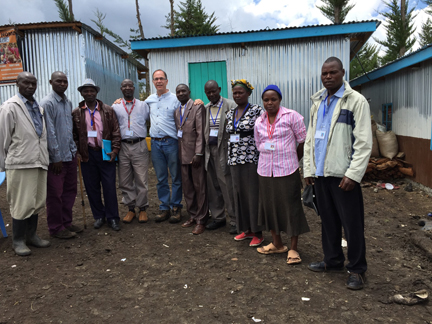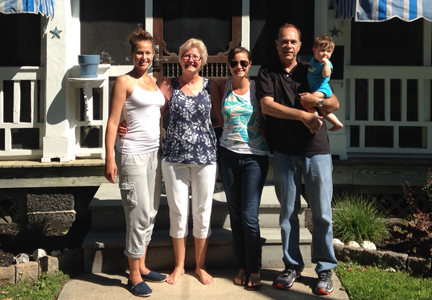Close Up: Art Livingston
Daring To Matter
Art Livingston’s volunteer experience in Africa brings him important life perspective
After donating music folders to the National Association for Music Education’s National Ensemble (NAfME) in 2012, Art Livingston, president of Neptune, New Jersey-based supplier Marlo Plastic Products (UPIC: marlo), was challenged by his daughter to do more.
As sponsors, Livingston and his family had been invited to the performance at The Kennedy Center. “During intermission, my daughter, Sarah, and I had a conversation where she challenged me to go beyond donating products and contribute my time too. The result of this conversation was that, throwing all logic aside, three weeks later we were both landing in Nairobi,” says Livingston.
The pair spent two months in Kenya, where Sarah volunteered at a medical clinic and Livingston helped out at two orphanages. The experience was one of the most memorable times of his life, he says. “This isn’t your five-star type of vacation, but if you want to experience Africa, meet people who have little and are happier than we are, and be able to do some good in other people’s lives, you’ll return home leaving a piece of your heart over there.”

Combining volunteering and travel (termed: voluntourism) has become a family affair, with Livingston’s wife of 34 years, Becky, accompanying him on one of his trips and his other daughter, Amanda, doing her own work in Africa and Central America. But Livingston has become comfortable going by himself as well.
“You quickly realize that this culture deals with things like lack of food, shelter and education on a scale that is difficult for us to comprehend. While we worry about clean water, they get their water from loading plastic jugs onto donkeys to make three trips (about two kilometers each way) per day, or simply going without in some cases. This scale of poverty really alters your mind as to what the word ‘important’ really means,” Livingston says.
As a devoted grandfather to Sarah’s son, David, it’s no wonder the kids in the orphanages have left such a mark on Livingston and are the main reason he returns twice a year to give back. He became a personal tutor for a 14-year-old boy named Eliud who was too old for the orphanage’s school. Livingston adds, “I asked him what he wanted to be when he grew up. ‘A lawyer,’ he answered. When I asked why, he said that he wanted to help people. It’s hard to imagine that this boy, who has virtually nothing, wants to help others. It brought a convicting perspective into my own life.”
What was your first job, and what lessons did you learn?
I worked with my dad at his machine company called Seal Pac, Inc. in Brooklyn, New York. My first job was cleaning dirty machine parts. I think the biggest lesson back then was integrity. My dad taught me pretty early that the most important asset is your name.
What was your first job in promotional products?
Before we purchased Marlo in 1989, we started a company in 1979 that manufactured flexible watch cases, pouches and items like that. Because our history was in machinery, we had expertise in how these machines worked and what they could do. People came to us if they had a complex item or a problem that needed to be corrected.
What motivates you in business and in life?
In business, developing a team/family atmosphere. Before we start our corporate training, we first communicate that everyone is of equal importance and explain the foundations of respect, safety and organization. Our aim is to teach everyone that this transcends throughout everything we do. In life, it’s easy to try to use time to make a positive difference.
What do you enjoy most about your work?
Without a doubt, our great relationships. Our customers, vendors, employees, network contacts and volunteer associates are more important than any one transaction. I really believe this [emphasis on relationships] is not only our corporate identity but hopefully a legacy that continues for many years.
How can you manage to be away for so long and still run your company?
We have a great team, so my feeling of being vital to the daily operations wasn’t completely accurate. I had limited access to email and could contact people a few times per week. It was communicated to me that things generally run better when I’m not there.
What advice would you give to an industry newcomer?
First, welcome. It’s a great industry. Second, don’t fear the challenges or the failures because adversity is what shapes you. Third, learn how to develop patience and the ability to listen. And at all times protect your name. As my dad told me, it’s your most important asset.
Three Benefits Of Voluntourism
1. It’s usually cheaper than a standard vacation package.
2. Your eyes will be opened to what goes on outside of your normal environment. “People have much less but seem much happier than we are,” Livingston says.
3. It can inspire you to look at how you prioritize money and wealth.


